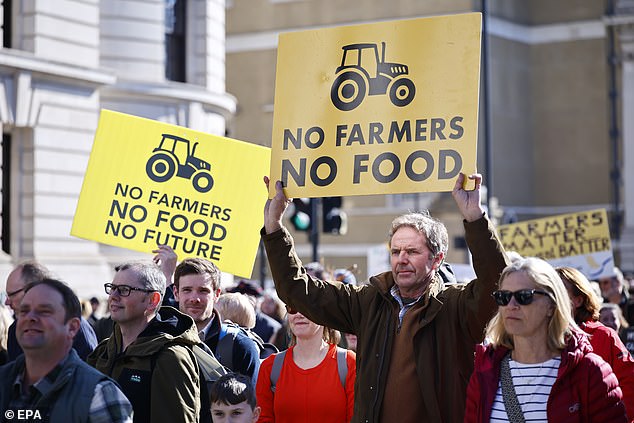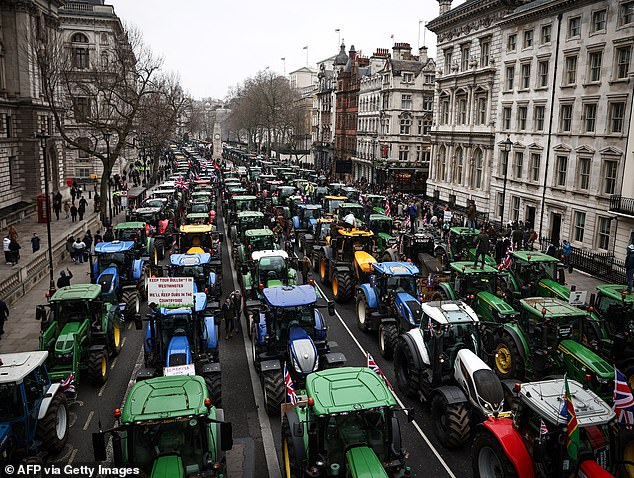Sir Keir Starmer has been put on notice of a fresh Labour rebellion over the Government’s ‘family farm tax’.
More than 40 Labour MPs are said to be considering a bid to water down looming changes to agricultural and business inheritance tax relief.
It comes after the Prime Minister performed a trio of embarrassing U-turns in recent weeks.
Sir Keir has reversed his position on axing the winter fuel payment for millions of pensioners, a national grooming gangs inquiry, and welfare cuts.
This has left Labour rebels feeling emboldened that they can force the Government into further policy changes.
According to the Telegraph, a group of Labour backbenchers are considering using amendments to legislation to exempt small family farms from a planned tax raid.
At last year’s Budget, Chancellor Rachel Reeves announced farmers will pay a 20 per cent rate of inheritance tax on land and property they inherit worth more than £1million.
The Government has insisted the measures – dubbed the ‘family farm tax’ and set to be in place from April 2026 – will only affect the wealthiest quarter of landowners.

Sir Keir Starmer has been put on notice of a fresh Labour rebellion over the Government’s ‘family farm tax’

Critics claim the tax raid could wipe out family-run farms with tight margins, as they will be forced to sell up in order to pay death duties

There have been months of demonstrations by farmers in response to the Chancellor’s tax raid, including tractor protests in Wesminster
But the National Farmers’ Union (NFU) and others say the impact of Ms Reeves’ measures will be much more widespread.
Critics claim the move could wipe out family-run farms with tight margins, as they will be forced to sell up in order to pay death duties.
There have been months of demonstrations by farmers in response to the Chancellor’s tax raid, including tractor protests in Wesminster.
A ‘rural growth group’ of Labour MPs is now proposing the raising of the £1million cut-off point at which estates lose their tax reliefs.
They have suggested estates receive full tax relief on the value of agricultural properties up to £10million, 50 per cent to £20million, and nil thereafter.
Sam Rushworth, Labour MP for Bishop Auckland, who is a member of the group, told the newspaper they would ‘consider what amendments to put down’.
Mr Rushworth said: ‘We are all keen to avoid amendments. I don’t want it to get to that point. I am a Labour MP and I broadly support the Government.
‘I would like to see them bring forward different recommendations in the Bill.’
Ex-Cabinet minister Louise Haigh, who was a leading rebel over the Government’s now partially-reversed welfare cuts, has called for Sir Keir to ‘reset’ his relationship with the British public.
‘I think this is a moment and an opportunity to reset the Government’s relationship with the British public and to move forward, to adopt a different approach to our economic policy and our political strategy,’ she told the BBC in the wake of the PM’s climbdown on welfare changes.
‘And I think that has been accepted from within government and a lot of people, both in the parliamentary Labour Party, but crucially, the country will really welcome that.’
The Government’s original welfare package had restricted eligibility for Personal Independence Payment (PIP), which is the main disability payment in England.
It also cut the health-related element of Universal Credit.
But, after Sir Keir offered concessions to rebel MPs, the changes to PIP will now only be implemented in November 2026 and apply to new claimants only.
All existing recipients of the health element of Universal Credit will also have their incomes protected in real terms.
A Government spokesman said: ‘Our reforms to agricultural and business property relief are vital to fix the public services we all rely on.
‘Three quarters of estates will continue to pay no inheritance tax at all, while the remaining quarter will pay half the inheritance tax that most people pay, and payments can be spread over 10 years, interest-free.
‘We’re investing billions of pounds in sustainable food production and nature’s recovery, slashing costs for food producers to export to the EU and have appointed former NFU president Baroness Minette Batters to advise on reforms to boost farmers profits.’












